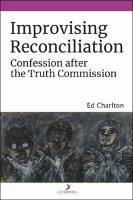Improvising Reconciliation
Confession after the Truth Commission
Author(s)
Charlton, Ed
Collection
Sustainable History Monograph Pilot (SHMP)Language
EnglishAbstract
"An Open Access edition of this book will be made available on the Liverpool University Press website and the OAPEN library on publication.
Improvising Reconciliation is prompted by South Africa’s enduring state of injustice. It is both a lament for the promise with which non-racial democracy was inaugurated and, more substantially, a space within which to consider its possible renewal. As such, this study lobbies for an expanded approach to the country’s formal transition from apartheid in order to grapple with reconciliation’s ongoing potential within the contemporary imaginary. It does not, however, presume to correct the contradictions that have done so much to corrupt the concept in recent decades. Instead, it upholds the language of reconciliation for strategic, rather than essential, reasons. And while this study surveys some of the many serious critiques levelled at the country’s Truth and Reconciliation Commission (1996-2001), these misgivings help situate the plural, improvised approach to reconciliation that has arguably emerged from the margins of the cultural sphere in the years since. Improvisation serves here as a separate way of both thinking and doing reconciliation. It recalibrates the concept according to a series of deliberative, agonistic and iterative, rather than monumental, interventions, rendering reconciliation in terms that make failure a necessary condition for its future realisation."
Keywords
South Africa;transition;drama;theatre;film;stage;Marc Kaplin;democracy;Truth;Commission;performance;separation;Farber;Ingrid Gavshon;Ramadan Suleman;justice;human rightsDOI
10.3828/9781800344808ISBN
9781800349261, 9781800344808, 9781800858428Publisher
Liverpool University PressPublisher website
https://www.liverpooluniversitypress.co.uk/Publication date and place
Liverpool, 2021Grantor
Classification
African history


 Download
Download Download
Download Web Shop
Web Shop